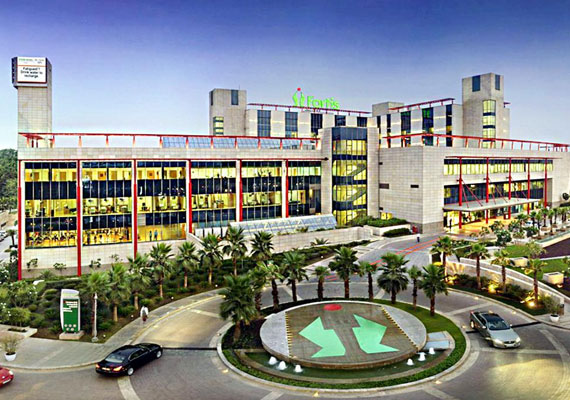
Proton Beam Therapy for Blood Cancer Treatment in India
29 Nov, 2023
 Healthtrip Team
Healthtrip TeamThe landscape of cancer treatment is witnessing a revolutionary change with the introduction of Proton Beam Therapy (PBT) in India. This advanced treatment, especially for blood cancers, is not just a ray of hope for patients but also a significant stride in India's medical prowess. In this blog, we'll explore how Proton Beam Therapy is transforming blood cancer treatment in India and how HealthTrip, a leading medical tourism company, can facilitate your journey towards recovery.
Transform Your Beauty, Boost Your Confidence
Find the right cosmetic procedure for your needs.

We specialize in a wide range of cosmetic procedures

Proton Beam Therapy:
Proton Beam Therapy is an advanced form of radiation therapy that uses protons instead of X-rays. Its precision in targeting tumors while sparing surrounding healthy tissues makes it a preferred choice for treating various cancers, including blood cancers like leukemia, lymphoma, and myeloma.
When is Proton Beam Therapy Used for Blood Cancer?
Proton Beam Therapy is considered for blood cancer patients in specific circumstances:
1. After Initial Diagnosis: PBT may be used as a primary treatment method soon after the diagnosis of certain types of blood cancers, especially if the cancer is localized or in a sensitive area where precision is crucial.
2. Post Chemotherapy: In some cases, PBT is employed after chemotherapy, especially if there are residual cancerous cells that need targeted destruction.
3. For Recurrent Cancer: If blood cancer recurs, especially in areas previously treated with radiation, PBT can be a safer option due to its precision and reduced risk of damage to already irradiated tissues.
Most popular procedures in India
Total Hip Replacemen
Upto 80% off
90% Rated
Satisfactory

Total Hip Replacemen
Upto 80% off
90% Rated
Satisfactory

Total Hip Replacemen
Upto 80% off
90% Rated
Satisfactory

ASD Closure
Upto 80% off
90% Rated
Satisfactory

Liver Transplant Sur
Upto 80% off
90% Rated
Satisfactory

4. In Advanced Stages: For advanced or complex cases where blood cancer has spread to areas near sensitive organs, PBT's targeted approach can be beneficial.
Why is Proton Beam Therapy Chosen for Blood Cancer?
1. Precision Targeting: PBT allows for precise targeting of cancer cells, which is particularly beneficial for blood cancers that may affect critical areas like the bone marrow or lymph nodes.
2. Reduced Side Effects: PBT minimizes exposure of healthy tissues to radiation, thereby reducing side effects. This is crucial for blood cancer patients who might already have weakened immune systems.
3. Lower Risk of Secondary Cancers: The reduced radiation dose to surrounding healthy tissues lowers the risk of developing secondary cancers, a significant concern for blood cancer patients.
4. Effectiveness in Complex Cases: PBT is effective in treating complex or inoperable tumors, which can sometimes occur in advanced stages of blood cancer.
Who Benefits Most from Proton Beam Therapy for Blood Cancer?
1. Pediatric Patients: Children with blood cancer benefit significantly from PBT due to its precision and reduced risk of long-term side effects, including growth and developmental issues.
2. Patients with Tumors Near Sensitive Areas: Patients whose blood cancer affects areas near vital organs (like the spine or brain) or those with tumors in hard-to-reach locations benefit from the precision of PBT.
3. Patients Requiring Re-treatment: Those who have previously undergone radiation therapy and need re-treatment can benefit from PBT, as it can more accurately target the tumor while minimizing additional exposure to surrounding tissues.
4. Patients with Specific Blood Cancer Types: Certain types of blood cancers, particularly those that are localized or have spread to areas near critical structures, are well-suited for PBT.
In summary, Proton Beam Therapy is a highly specialized and targeted form of radiation therapy that offers significant benefits for blood cancer treatment, particularly in terms of precision and reduced side effects. It is especially beneficial for pediatric patients, those with tumors near sensitive areas, patients requiring re-treatment, and specific types of blood cancers.
What happens in the Proton Beam Therapy for Blood Cancer ?
1. Initial Consultation and Evaluation: Patients with blood cancer will meet with a radiation oncologist specializing in PBT. This consultation involves reviewing the patient's medical history, focusing on their blood cancer diagnosis, previous treatments, and overall health. Diagnostic tests, such as MRI or CT scans, are crucial to determine the extent of the blood cancer and its impact on organs and tissues.
2. Treatment Planning:
- Simulation: For blood cancer patients, the simulation stage is critical to map the cancer's spread and involvement accurately. This might involve creating immobilization devices to target areas like the bone marrow or lymph nodes.
- Planning Scans: Detailed scans are essential to identify and model the areas affected by blood cancer.
- Dosimetry: This step is vital for blood cancer treatment, as it involves calculating the precise proton dose needed to target cancer cells effectively while sparing healthy bone marrow and other critical organs.
3. The Treatment Sessions:
- Setup: Patients are positioned carefully, often using custom-made devices. Precise alignment is crucial for targeting areas affected by blood cancer.
- Delivery of Proton Beams: PBT for blood cancer involves directing high-energy protons to the targeted areas, ensuring maximum impact on cancer cells.
- Precision Targeting: The Bragg peak principle is particularly beneficial for blood cancer, as it allows for maximum energy release at precise depths, targeting cancer cells while sparing healthy tissues.
- Duration: Sessions are usually short in terms of actual proton delivery but require precision in setup and alignment.
4. Frequency and Duration of Treatment: The number of PBT sessions for blood cancer depends on the cancer type, stage, and individual patient factors. Typically, treatment is scheduled five days a week over several weeks.
5. Side Effects and Recovery: Blood cancer patients undergoing PBT may experience fewer side effects compared to traditional radiation. However, they might still face fatigue or skin reactions, depending on the treatment area. The healthcare team will provide tailored guidance for managing these effects, considering the unique aspects of blood cancer.
6. Follow-Up: Post-treatment, blood cancer patients have regular follow-ups to monitor recovery and assess the treatment's effectiveness. This includes physical exams and relevant tests to track the response of the blood cancer to the therapy.
Key benefits of Proton Beam Therapy (PBT) in India :
- Targeted Treatment: PBT offers precise targeting of cancerous cells in blood cancers, minimizing damage to surrounding healthy bone marrow and other vital organs.
- Reduced Side Effects: Due to its precision, PBT typically results in fewer side effects compared to traditional radiation, which is particularly beneficial for blood cancer patients who might already have compromised immune systems.
- Suitable for Repeated Treatments: For blood cancer patients who require multiple rounds of radiation, PBT's precision makes it a safer option as it limits cumulative radiation exposure to healthy tissues.
- Potential for Better Outcomes: The accuracy of PBT in targeting blood cancer cells can potentially lead to better control of the disease and improved overall outcomes.
- Enhanced Quality of Life: With reduced side effects and targeted treatment, patients often maintain a better quality of life during their treatment journey.
Side effects of Proton Beam Therapy (PBT) and tips for managing
1. Skin Reactions:- Mild redness, irritation, or dryness in the treated area.
- Management Tip: Use gentle, unscented skin care products and avoid sun exposure on treated areas.
2. Fatigue:
- General tiredness or lack of energy.
- Management Tip: Balance rest with light exercise, such as walking, to boost energy levels.
3. Hair Loss:
- Temporary hair loss in the treatment area.
- Management Tip: Use gentle hair care products and consider soft head coverings for comfort.
4. Nausea and Vomiting:
- Especially if the treatment area is near the stomach.
- Management Tip: Eat small, frequent meals and avoid foods with strong odors or high fat content.
5. Mouth and Throat Soreness:
- If the head, neck, or throat area is treated, leading to difficulty swallowing.
- Management Tip: Use a soft toothbrush, rinse with saltwater, and eat soft, bland foods.
6. Diarrhea:
- Common when the abdomen or pelvis area is treated.
- Management Tip: Stay hydrated, consider a low-fiber diet, and discuss over-the-counter remedies with your doctor.
7. Blood Count Changes:
- Affects white and red blood cells, and platelets.
- Management Tip: Regular monitoring by your healthcare team and practice good hygiene to avoid infections.
Proton Beam Therapy in India: The Emerging Hub
India's entry into Proton Beam Therapy is marked by the establishment of world-class facilities equipped with cutting-edge PBT technology. These centers are a reflection of India's commitment to advanced medical care.
Key Benefits of Opting for PBT in India with HealthTrip:
- Advanced Technology: Access to the latest PBT technology.
- Cost-Effectiveness: Affordable treatment options compared to Western countries.
- Expert Medical Teams: Treatment from highly experienced oncologists.
- Personalized Care: Tailored treatment plans for each patient.
- Cultural Comfort: A culturally familiar environment for many patients.
Leading hospitals in India offering PBT
1. Apollo Proton Cancer Centre (APCC), Chennai:
- Specialty: APCC is India's first dedicated Proton Therapy Center and one of the most advanced in Asia.
- Facilities: Equipped with state-of-the-art Pencil Beam Scanning technology, which allows for highly precise tumor targeting.
- Expertise: The center boasts a team of experienced oncologists, physicists, and technicians specialized in proton therapy.
- Treatments: Offers comprehensive care for a range of cancers, including pediatric cancers, with a focus on minimizing side effects
- Technology: Known for its cutting-edge medical technology and world-class facilities.
- Oncology Team: Includes highly skilled oncologists and support staff providing personalized care.
- Patient Care: Focuses on patient-centric treatment, offering services like counseling and rehabilitation alongside medical treatment.

- Network: Part of the HCG group, which is one of India’s largest cancer care hospital networks.
- Innovation: Known for adopting the latest technologies and treatment protocols in oncology.
- Specialization: Offers specialized treatment for various types of cancers, with a focus on providing affordable care.
4. Medanta - The Medicity, Gurgaon:

- Multidisciplinary Approach: Known for its comprehensive and integrated approach to cancer care.
- Expertise: Staffed with renowned oncologists and surgeons, offering advanced treatment options.
- Facilities: Equipped with modern technology and infrastructure to provide high-quality care.
Each of these hospitals has its unique strengths, and the choice often depends on the specific type and stage of cancer, the patient's overall health, and geographical and financial considerations. It's always advisable to consult with healthcare professionals to choose the most appropriate treatment facility.
Navigating the Process with HealthTrip:
HealthTrip simplifies your journey to receiving Proton Beam Therapy in India:
- Initial Consultation: Contact HealthTrip for an initial consultation. Our team will guide you through the process and connect you with top PBT centers in India.
- Medical Evaluation: HealthTrip will assist in sharing your medical history and records with Indian oncologists for a comprehensive evaluation.
- Treatment Planning: If PBT is right for you, HealthTrip will help devise a personalized treatment plan.
- Travel and Accommodation: HealthTrip provides end-to-end assistance in organizing your travel, visa, and stay in India.
- On-Ground Support: From airport pickups to post-treatment care, HealthTrip ensures a seamless experience.
- Post-Treatment Care: HealthTrip stays connected for any post-treatment follow-up and assistance.
Take the next step in your fight against blood cancer. Contact us to learn more about Proton Beam Therapy in India and how it can benefit you. Let's embark on this journey towards healing together.
Proton Beam Therapy in India isn't just about advanced cancer treatment; it's about a holistic approach to healing. With its combination of cutting-edge technology, skilled medical professionals, and patient-centric care, India is poised to become a leading destination for blood cancer treatment globally. If you're exploring treatment options, PBT in India could be the game-changer in your cancer journey.
Wellness Treatments
Give yourself the time to relax
Lowest Prices Guaranteed!

Lowest Prices Guaranteed!









